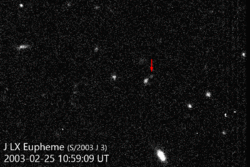Eupheme (moon) facts for kids

Images of Eupheme by the Canada-France-Hawaii Telescope in February 2003
|
|
| Discovery | |
|---|---|
| Discovered by | Scott S. Sheppard |
| Discovery date | 2003 |
| Designations | |
| MPC designation | Jupiter LX |
| Pronunciation | /juːˈfiːmiː/ |
|
Named after
|
Ευφήμη Eyphēmē |
| S/2003 J 3 | |
| Adjectives | Euphemean /juːfɪˈmiːən/ |
| Orbital characteristics | |
| 21199710 km | |
| Eccentricity | 0.253 |
| −628.06 days | |
| 168.7° | |
| Inclination | 148.0° |
| 292.0° | |
| 109.0° | |
| Satellite of | Jupiter |
| Physical characteristics | |
|
Mean diameter
|
2 km |
| 23.4 | |
Eupheme is one of the many moons that orbit the giant planet Jupiter. It is also known as Jupiter LX. This small moon is about 2 kilometers (1.2 miles) wide. It travels very far away from Jupiter.
Contents
Discovering Eupheme
When Was Eupheme Found?
A group of scientists found Eupheme in 2003. They were from the University of Hawaii. Scott S. Sheppard led this team of astronomers.
After they first saw it, the moon became "lost." This means they couldn't find it again for a while. But in 2017, they found Eupheme again! That's when it got its official name.
Naming the Moon
How Did Eupheme Get Its Name?
Eupheme got its name in 2019. It is named after Eupheme, a spirit from ancient Greek stories. She was known for words of good luck and praise. Eupheme was the daughter of Hephaestus and Aglaea. She was also the granddaughter of Zeus.
The name was chosen through a contest. A person on Twitter suggested the name. This contest was held by the Carnegie Institute. The same person also helped name another one of Jupiter's moons, Philophrosyne.
Eupheme's Orbit Around Jupiter
How Eupheme Travels
Eupheme travels around Jupiter. It orbits at an average distance of about 19.6 million kilometers (12.2 million miles). It takes Eupheme about 628 days to complete one trip around Jupiter.
This moon orbits in a "retrograde" direction. This means it moves in the opposite direction to Jupiter's spin. Its path is also tilted quite a bit, about 146 degrees.
The Ananke Group
Eupheme is part of a group of moons called the Ananke group. These are "irregular" moons. This means they have orbits that are not perfectly round. They also orbit far from Jupiter.
Moons in the Ananke group travel between 19.3 and 22.7 million kilometers from Jupiter. Their orbits are usually tilted around 150 degrees.
See also
 In Spanish: Eufeme (satélite) para niños
In Spanish: Eufeme (satélite) para niños

